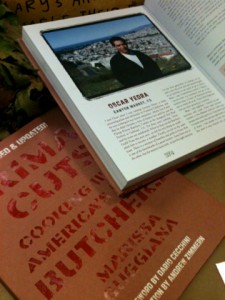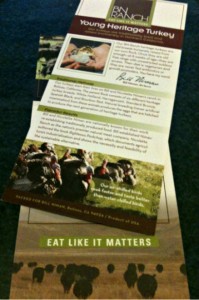 Sometimes being a “foodie” means more than just trying out the current trendy restaurants, or snapping crave-inducing shots of the gorgeous plate in front of you (guilty!). Sometimes, it means digging deeper to find out where your food really comes from, and really understanding what you’re putting in your body with that next bite. This guest post was written by Parties That Cook’s very own Operations Manager, Heather McCarthy.
Sometimes being a “foodie” means more than just trying out the current trendy restaurants, or snapping crave-inducing shots of the gorgeous plate in front of you (guilty!). Sometimes, it means digging deeper to find out where your food really comes from, and really understanding what you’re putting in your body with that next bite. This guest post was written by Parties That Cook’s very own Operations Manager, Heather McCarthy.
The term “Meatless Mondays” has become quite the catch phrase; a testament to the success of the campaign launched to reduce the environmentally taxing production and consumption of meat. With Paul McCartney as the campaign poster child, it’s not entirely surprising the movement has found traction. Being familiar with the term and the goals of the movement, I was caught off guard when I noticed my local market, Canyon Market, chose to host an event celebrating meat. They even stamped the words “EAT MEAT” in blood red letters across the announcement board advertising the event.
 While the crafty marketing might suggest the event would rebel against “Meatless Mondays,” participating vendors actually support the campaign. At the event, I had the opportunity to meet the people behind Mary’s Air Chilled Chicken and Becker Lane Organic Farm. I also met Canyon Market’s famed butcher, Oscar Yedra – winner of the Flying Knives Butchery competition for the past four years and featured butcher in Marissa Guiggiana’s new book, Primal Cuts. Each vendor shared samples of their product and was eager to share insider knowledge (like why air chilled is important for chicken and what sets heritage pork apart).
While the crafty marketing might suggest the event would rebel against “Meatless Mondays,” participating vendors actually support the campaign. At the event, I had the opportunity to meet the people behind Mary’s Air Chilled Chicken and Becker Lane Organic Farm. I also met Canyon Market’s famed butcher, Oscar Yedra – winner of the Flying Knives Butchery competition for the past four years and featured butcher in Marissa Guiggiana’s new book, Primal Cuts. Each vendor shared samples of their product and was eager to share insider knowledge (like why air chilled is important for chicken and what sets heritage pork apart).
Fortunately for me, plentiful samples distracted most attendees. I took advantage of the opportunity to have a lengthy conversation with Bill Niman, one of the founders of sustainable meat production in the US. Having walked away from his namesake national brand, Niman Ranch, several years ago, Bill was at Canyon Market promoting his new operation, BN Ranch. Bill’s primary focus now is to produce sustainable, humanely raised meat. When his first company lost sight of this with expansion, he left to start over with a smaller operation. Bill shared his thoughts with me on the devaluation of the meat market and how the true cost of meat has been lost with agribusiness. We discussed the need for people to be open to using meat as flavoring rather than the centerpiece of the main course and how eating meat less often and in smaller quantities can offset the higher cost of sustainably produced meat.
 When I asked how he responds to claims it is not feasible for all farms and ranches to adopt the sustainable and environmentally conscious practices he employs at BN Ranch, he explained we have fewer cows in this country than in 1976 and we have enough land to support grass feeding cattle nationally but the current structure of the farming industry and our focus on corn and soy as well as farm subsidies hinders our abilities to build a national sustainable meat production model.
When I asked how he responds to claims it is not feasible for all farms and ranches to adopt the sustainable and environmentally conscious practices he employs at BN Ranch, he explained we have fewer cows in this country than in 1976 and we have enough land to support grass feeding cattle nationally but the current structure of the farming industry and our focus on corn and soy as well as farm subsidies hinders our abilities to build a national sustainable meat production model.
Walking away from my conversation with Bill, I appreciated speaking with a man so driven to lead by example – continuing to encourage people to know their rancher, their farmer, and their butcher. Bill Niman’s own experiences serve as a cautionary tale that brands and labels cannot always be trusted. The Niman Ranch brand represented sustainable, responsible meat production for decades and was synonymous with high quality even amongst discriminating chefs. Unfortunately, this is no longer the case. Big thanks to Canyon Market for giving me the opportunity to meet my butcher, Oscar. Luckily, you do not need your market to host a meat festival to meet your butcher. Talk to your butcher, let them share their knowledge of the animal with you and do not shy away from the more expensive grass fed and finished beef. You can always just buy less and make a delicious bolognese instead of meatballs for your spaghetti.

; ?>/img/parties-that-cook-blog-logo.jpg)

